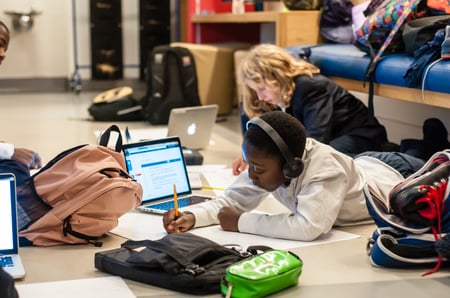HOW UNITS OF STUDY 'TALK' IN THE IB CURRICULUM
November 14, 2017 admin Inquiry, Education, GEMS World Academy Chicago, International Baccalaureate, Progression of knowledge
![]()
![]()
![]()
![]() Pre-K students at GEMS World Academy Chicago complete a unit on symbiosis, which revolves around the idea that humans and animals rely upon and affect one another.
Pre-K students at GEMS World Academy Chicago complete a unit on symbiosis, which revolves around the idea that humans and animals rely upon and affect one another.
 In first grade, students complete a unit on biodiversity, during which they consider the importance of maintaining the balance of organisms within systems.
In first grade, students complete a unit on biodiversity, during which they consider the importance of maintaining the balance of organisms within systems.
Fourth-graders complete a unit on interdependence. And fifth-graders present a year-end exhibition that explores some aspect of sharing the planet.
Each of these inquiries, which are part of the International Baccalaureate curriculum framework in place at GEMS, succeeds as a discrete learning experience. But taken together, the units create a deep and rich exploration of bigger concepts, like connection and responsibility. This exploration increases in complexity as students age.
This, educators say, is the true power of the IB — the way the individual units of inquiry "talk" to one another and the way they link to create a cohesive academic program.
"It's a real progression of knowledge," GEMS kindergarten teacher Sharon Moore said. "Concepts that students first explore in pre-K keep coming back as they move through the program, but in deeper ways. By the time our students reach the fifth-grade exhibition, they're doing incredibly sophisticated work."
GEMS, a premier private school, uses all three IB academic programs. The Primary Years Program (PYP) serves students in pre-K through Grade 5. The Middle Years Program (MYP) serves grades 6 through 10, and the Diploma Program (DP) serves grades 11 and 12. (GEMS is an authorized IB World School for the PYP and MYP, and we are a candidate school for the DP.)
 Teachers make it a priority to ensure that the curriculum is aligned throughout, Moore said.
Teachers make it a priority to ensure that the curriculum is aligned throughout, Moore said.
"We look at the progression purposefully," she said. "It's the key to developing the high level of thinking that we all want to see in our students."
The progression seen across the PYP continues as students enter the later programs. For example, the PYP units that deal with society and government — "Communities" in junior kindergarten; "Change Catalysts" in third grade; "Cultural Geography" in fourth grade, to list just a few — lay the groundwork for the exploration of identity and human migration in the MYP.
Students who go through the entire continuum are uniquely prepared not just for college, but for the increasingly connected world that awaits beyond. Research shows, for example, that DP graduates consistently have higher college retention rates and higher graduation rates than non-IB peers. And DP students are accepted to top universities — Stanford University, Harvard University and Princeton University among them — at a higher rate than the general pool of applicants.
.jpg?width=550&name=GEMS%20World%20Academy%20-%20Chicago%20Parent%20Assessment%20Nov%202017%20(2).jpg)
But the value of the IB stretches into the global workplace, too.
"One of the key concepts that we explore again and again is change — how matter, people, governments and civilizations evolve over time," Moore said. "Students who go through the IB from the beginning can see the systems at work in the world, and they know how to adapt to changes in those systems. That makes them extremely good problem-solvers and leaders."
